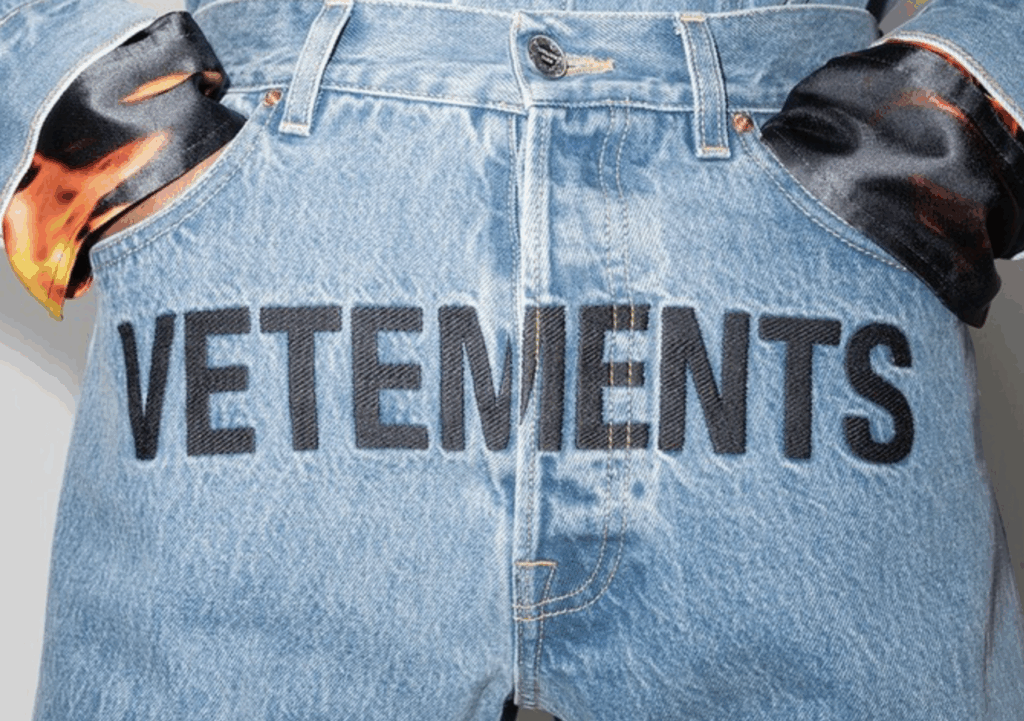Vetements is taking a fight over its name all the way to the Supreme Court, asking the U.S.’s highest court to decide whether foreign-language trademarks should be judged by how American consumers see them – or on how they translate into English. The outcome will not only determine Vetements’ ability to register its name – which the U.S. Patent and Trademark Office refused to register on the grounds that it translates to the generic term ‘clothing’ and is ‘highly descriptive’ with an insufficient showing of acquired distinctiveness – but also the future of how global fashion houses secure protection for brand identities rooted in non-English terms.
The Background in Brief: The clash traces back to Vetements’ attempt to secure trademark registrations in the U.S. for its name for use on various types of clothing and “[o]nline retail store services for” clothing. The U.S. Patent and Trademark Office rejected Vetements’ application in December 2021 on the basis that “vetements” – which simply means “clothing” in French – is generic when translated into English.
The Trademark Trial and Appeal Board and the Federal Circuit upheld the USPTO’s position after applying the “doctrine of foreign equivalents,” which directs examiners and courts to translate foreign words into English before determining whether they are distinctive enough to qualify for protection. In Vetements’ case, the result was straightforward: If “vetements” translates to “clothing,” the mark is descriptive at best when used in connection with clothing.
At stake is whether U.S. law continues to treat foreign marks through a rigid lens of translation or instead aligns with modern trademark principles that turn on consumer perception.
Taking the Fight to the High Court
In its August petition for certiorari, Vetements characterizes the Federal Circuit’s decision as outdated and at odds with trademark law’s core principle: that registrability hinges on consumer perception. The brand stresses that fewer than 1% of Americans speak French well enough to connect vetements with “clothing.” For the vast majority of U.S. consumers, the word carries no descriptive meaning; it signals a fashion label, one deliberately styled with a French identity that feels distinctive in the marketplace.

> Doctrine of Foreign Equivalents: This judge-made rule requires courts and the U.S. Patent Trademark Office to translate non-English marks into English before deciding if they are distinctive enough to function as trademarks. Intended to prevent companies from monopolizing everyday foreign words, Vetements argues that the doctrine has hardened into a blunt instrument ill-suited to modern trademark law. The brand points to Supreme Court precedent: in Menendez v. Holt (1888), the Court protected the Spanish-language mark “La Favorita” without translating it, and in Booking.com (2020), it underscored that genericness depends on consumer perception, not linguistic theory.
By refusing to register Vetements simply because it translates to “clothing,” Vetements maintains that the Federal Circuit ignored both history and consumer reality.
The Supreme Court has not reviewed the doctrine of foreign equivalents in over a century, and if it takes the case, it could affirm the Federal Circuit and keep Vetements unregistrable, clarify or limit the doctrine in line with Booking.com’s consumer-focused approach, or overhaul entirely how U.S. law treats non-English marks.

THE BOTTOM LINE: For now, the petition leaves the question hanging: should a French word be judged by what less than 1% of Americans translate it to mean – or by what the other 99% actually perceive? If the Court grants review, the decision could recalibrate how global fashion brands safeguard their most valuable asset: their name.
The case is In re Vetements Group AG, 137 F.4th 1317 (Fed. Cir.).
Updated
September 11, 2025
SCOTUS did not grant cert for this case, leaving the Federal Circuit’s ruling to stand.














